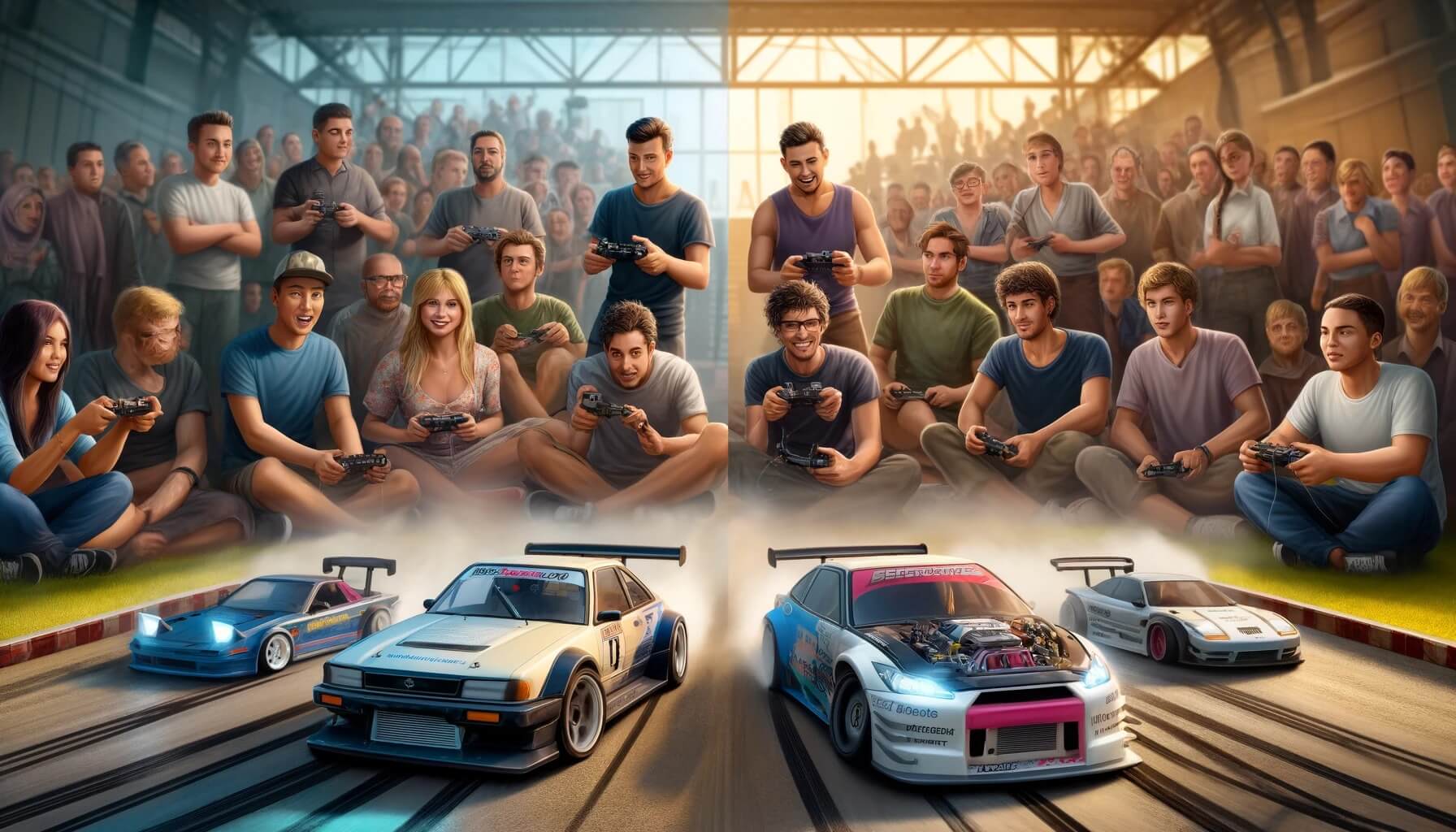Introduction to RC Drifting
Before I delve into RC Drifting as a Hobby vs. Competitive Sport, let me explain RC drifting. It is a thrilling activity that involves maneuvering remote-controlled cars around a track, mimicking the style of real-life drifting. It has gained popularity worldwide, attracting enthusiasts of all ages.
While many participate in RC drifting as a hobby for fun and relaxation, others pursue it as a competitive sport, aiming for victory and recognition.
RC Drifting as a Hobby
- For hobbyists, RC drifting offers a recreational outlet where they can enjoy the excitement of drifting their remote control drift car without the pressure of competition.
- It provides an opportunity to unwind and bond with fellow enthusiasts.
- One of the main appeals of RC drifting as a hobby is the freedom to customise and personalise one’s car according to individual preferences and style.
- Hobbyists often engage in casual meetups and gatherings, sharing tips, techniques and experiences with other enthusiasts in a supportive and inclusive community.
- Participating in RC drifting as a hobby allows individuals to explore their creativity, improve their driving skills, and build lasting friendships within the community.
Competitive RC Drifting
- In recent years, RC drifting has evolved into a highly competitive sport, with organised events, tournaments and professional leagues attracting skilled racers from around the world.
- Competitive Remote Control drifting involves intense training / Practice, precision driving, and strategic decision-making, as drifters compete for podium finishes and championship titles.
- Competitive events often feature strict rules and regulations to ensure fair competition. While judges are evaluating factors such as proximity, angle, and style during each run.
- Top competitors may receive sponsorships, endorsements, and recognition for their achievements, elevating RC drifting from a hobby to a professional pursuit.
RC Drifting as a Hobby vs. Competitive Sport: Key Differences
- Hobbyist drifting focuses on enjoyment and personal satisfaction, with participants prioritizing fun and relaxation over competitive success.
- Competitive drifting, on the other hand, places a greater emphasis on performance, skill development and achieving competitive goals.
- While hobbyists may modify their cars for aesthetic appeal and individual style and some performance, competitive racers focus on optimising their setups for maximum speed, control, and consistency with a common goal to win.
- Hobbyists often participate in informal events and gatherings, while competitive racers adhere to structured schedules and training regimens to prepare for competitions.
- This can create two very different atmospheres where hobbyists want to share information and learn from each other vs. competitors keeping their technical secrets.
Equipment and Setup
- Hobbyist setups are often customised to reflect individual preferences and creative expression, with enthusiasts experimenting with different chassis, bodies, and modifications.
- Competitive setups are meticulously tuned and optimised for performance, with drifters selecting specific components and configurations to gain a competitive edge.
- Cost considerations vary between hobbyists and competitive racers, with hobbyist setups typically (but not always) being more budget-friendly and competitive setups requiring greater investment in high-performance equipment.
Training and Skill Development
- Hobbyists typically learn through trial and error, practicing at their own pace and seeking guidance from fellow enthusiasts within the community.
- Competitive racers follow structured training / practice regimens, focusing on improving driving techniques, mastering track layouts, and refining their setups for optimal performance.
- Skill refinement and consistency are essential for competitive success, with racers dedicating time and effort to hone their driving skills and adapt to changing track conditions.
Community and Support
- Hobbyists benefit from a supportive and inclusive community of enthusiasts who share a passion for RC drifting and are eager to help newcomers learn and improve.
- Competitive racers often belong to teams, where they receive mentorship, coaching, and support from experienced drivers and industry professionals.
- Both hobbyists and competitive racers enjoy opportunities for networking, collaboration and camaraderie within the RC drifting community. They both foster friendships and lifelong connections.
Rewards and Recognition
- For hobbyists, the main reward of RC drifting is the enjoyment and satisfaction derived from participating in the hobby, regardless of competitive success.
- Competitive drifters strive for podium finishes, championship titles, and recognition from peers and sponsors, elevating their status within the RC drifting community.
- While hobbyists may not receive formal recognition or awards, they find fulfillment in mastering new skills, overcoming challenges, and sharing their passion with others.
RC Drifting as a Hobby vs. Competitive Sport Conclusion:
RC drifting offers something for everyone, whether you’re seeking relaxation, recreation, or competitive excitement. Whether you choose to pursue RC drifting as a hobby or a competitive sport, the most important thing is to enjoy the experience and find fulfillment in your participation.
By exploring both avenues and discovering what resonates with you, you can unlock the full potential of RC drifting and become part of a vibrant and dynamic community of enthusiasts.


Leave a Reply
You must be logged in to post a comment.